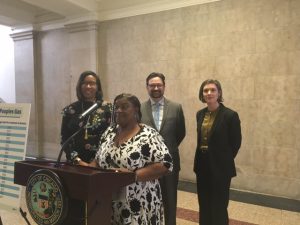
From left to right, Chicago City Treasurer Melissa Conyears-Ervin; Chicago resident Rosazlia Grillier (foreground); Illinois PIRG Director Abe Scarr; and CUB Deputy Director Sarah Moskowitz spoke out against the Peoples Gas rate hike at a City Hall news conference on June 1. Tap the picture to watch a recording of the news conference.
With Peoples Gas making record profits while customers struggle to afford their bills under the utility’s mismanaged pipeline-replacement program, the Citizens Utility Board (CUB) said Thursday it is working to reduce the utility’s record rate-hike request by more than $100 million.
CUB Executive Director David Kolata said the consumer group’s expert testimony, filed in May, recommended roughly $63 million in reductions. Kolata said the consumer group expects to support $49.2 million in additional reductions in testimony from Illinois Attorney General Kwame Raoul’s office, for a
combined total of about $112 million.
“Peoples Gas customers have been suffering for years under rapidly rising bills, as the company rakes in record profits,” Kolata said. “This rate hike is unjust and unreasonable, and we urge state regulators to hold the utility accountable. The writing is on the wall: As climate change worsens and our bills get higher, we can’t afford to continue bailing out Peoples Gas and an outdated and expensive fossil fuel system.”
Kolata asked Chicagoans to visit CUBHelpCenter.com to sign a petition to the Illinois Commerce Commission (ICC) against what is the largest gas rate-hike request in Illinois history.
On January 6, Peoples Gas filed for a $402 million increase in the rates it charges to deliver the heating fuel to homes. The proposed increase would raise delivery rates by an average of $11.83 a month, or more than $140 a year.
The record rate-hike request was the latest bad news for Chicago gas customers, who have suffered for years under a crisis of rising utility costs, fueled by Peoples’ reckless spending in its mismanaged pipeline-replacement program and six straight years of record profits for the company. The utility’s out-of-state parent
company, Wisconsin-based WEC Energy Group, pulled in $1.4 billion in profits in 2022, and has said the pipe-replacement program is a profit driver.
Launched in 2011, the pipeline project has been behind-schedule and over-budget almost from the beginning, with its projected costs rising from about $2 billion to as much as $11 billion. For years, audits, studies and analyses have found problems—and in the latest filing with state regulators, the company admitted it had not
done an overall cost-analysis of the program since 2015.
In 2013, Peoples Gas successfully lobbied to help pay for the pipe-replacement program through a ballooning, legislatively approved surcharge on customer bills, known as the “Qualified Infrastructure Plant” or “QIP” charge, due to sunset at the end of this year. Legislators originally were told the charge would only cost
Chicagoans about $1.14 a month, but in the first few months of 2023, they paid about $15 per month, on average, according to a first-quarter report filed with the ICC.
Customers now pay about $50 a month in total fixed charges—before using any gas—and there are alarming signs that a large number of residents can’t afford their gas bills. In April, more than one in five Peoples Gas customers were more than 30 days behind on their bills, by a total of $134 million—worse than any other
major utility in Illinois.
Knowing the proposed Peoples Gas rate hike will make conditions even worse for customers, CUB, the City of Chicago and People for Community Recovery partnered to commission expert analysis from Brubaker & Associates, Inc., a Missouri-based consulting firm that specializes in utility regulation. Through the testimony, CUB makes several recommendations to slash the rate hike by at least $63 million.
Return on Equity. Peoples Gas is asking for an excessive “return on equity” (ROE)—or profit rate for shareholders—of nearly 10 percent. Instead, CUB argues for a more reasonable 9.5 percent ROE, which would reduce the rate hike by $14 million. ROE is the most important component of a utility’s “rate of return,” which
is the rate at which the utility recovers the cost of financing physical assets, such as gas meters, pipes and storage fields.
Capital Structure. CUB also found problems with another key component of rate of return: “capital structure”—basically how it finances infrastructure projects. CUB argued that the utility’s proposed “common equity ratio”—how much of the utility’s financing comes from issuing stocks—was too high. The more
reasonable equity ratio CUB recommended would reduce the rate hike by another $18 million.
Executive Bonuses. CUB argued that customers shouldn’t cover bonuses the company gives to executives for reaching financial goals that only benefit shareholders. That recommendation cut the proposed rate hike by about $9 million.
Other financial adjustments, including issues related to pension and cash working capital, totaled about $21 million for total reductions of about $63 million.
About $207 million of the total $402 million rate hike is for charges customers have already been paying, through the QIP surcharge. Under the Peoples Gas rate-hike proposal, the QIP surcharge amount would be rolled into delivery rates going forward.
The ICC will rule on the rate-hike request around November, after an 11-month rate case. The proposed increase would impact delivery rates–what the utility charges to cover the costs of delivering gas to customer homes, plus a profit. Those rates take up about a third to a half of gas bills.
Peoples Gas delivers natural gas to more than 884,000 customers in the city of Chicago.

